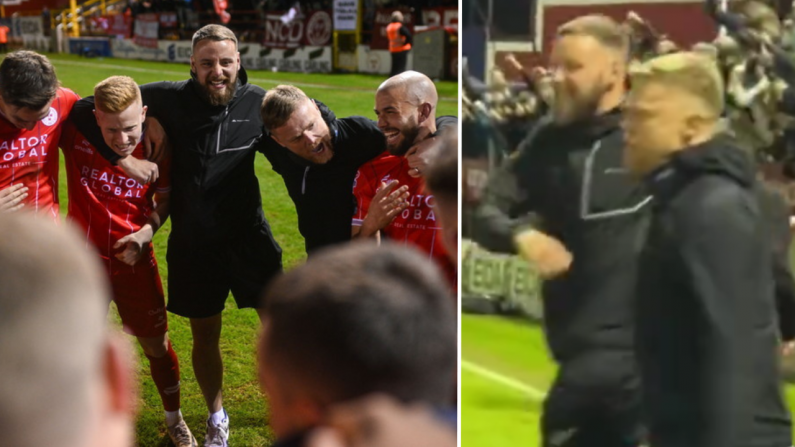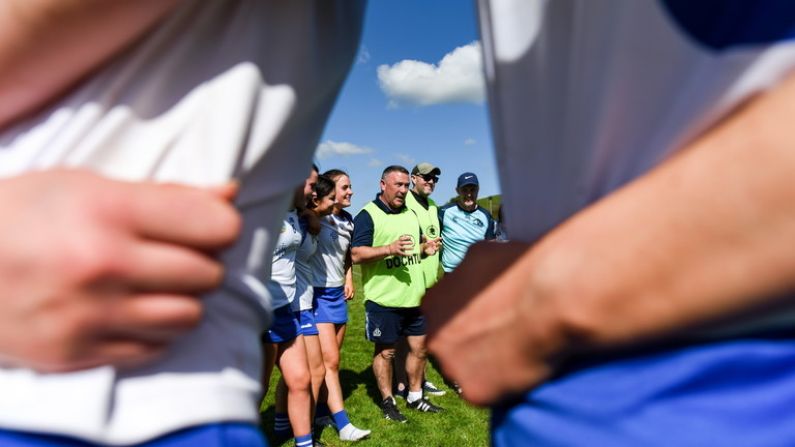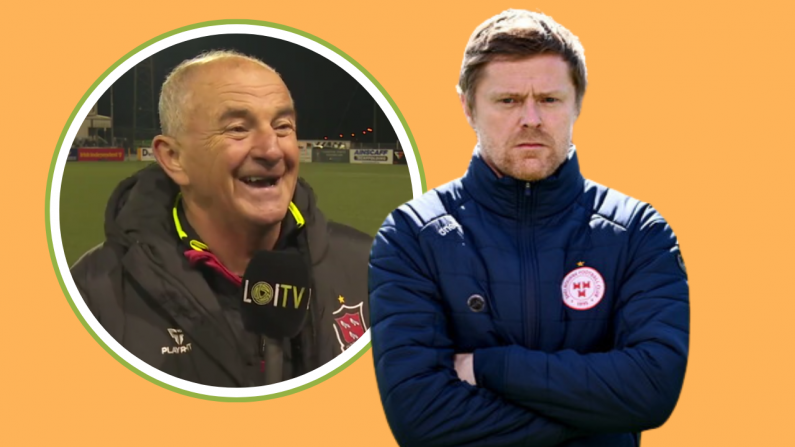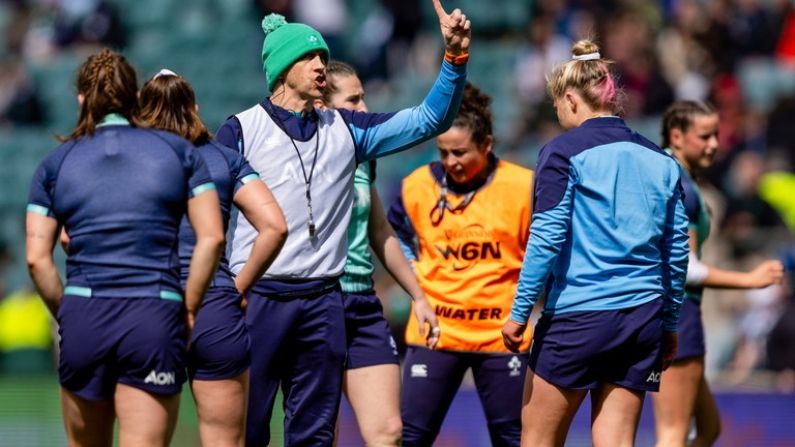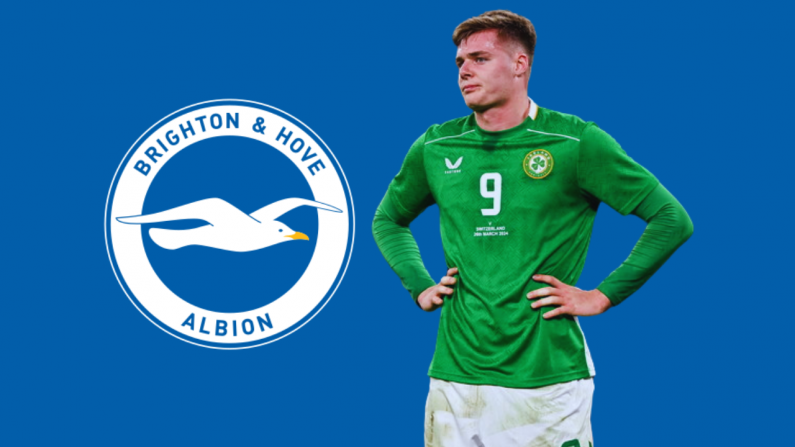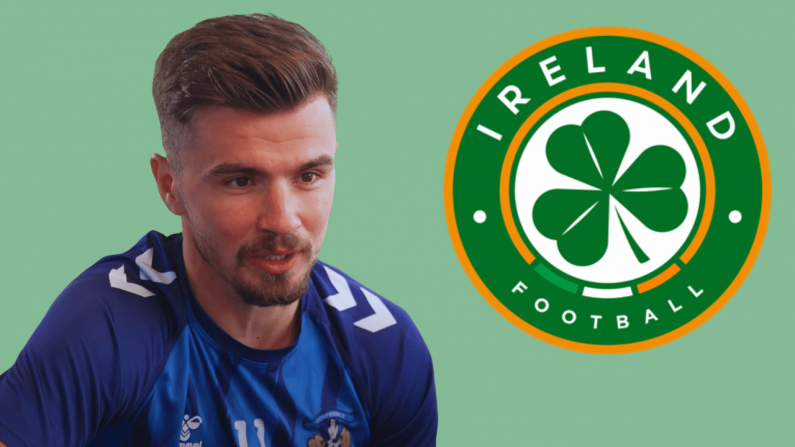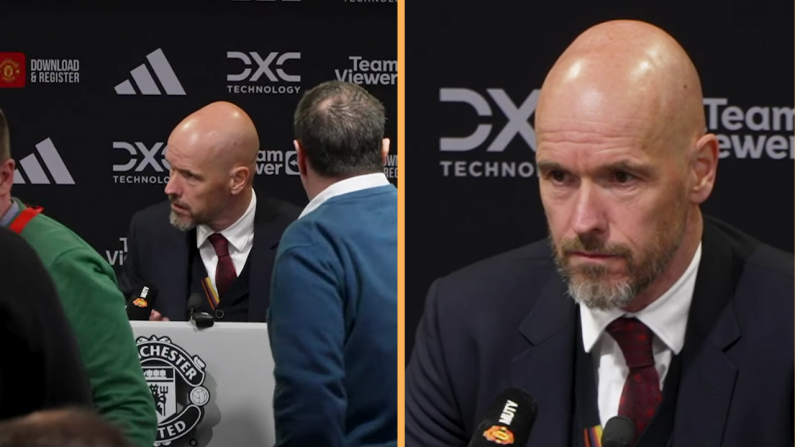The final twist of the knife came from RTE's continuity announcer: "And after the break, we will have more comedy with Cheers".
Eoin Hand's reign as Republic of Ireland manager had ended hours earlier, as Denmark ransacked a virtually empty Lansdowne Road, 4-1. Denmark, having beaten Ireland 3-0 in Copenhagen earlier in the group, befuddled an Irish side already confused by playing an experimental 3-5-2 formation. For all of Ireland's troubles, Denmark were breathtaking and left Dublin as among the favourites to win the World Cup the following year.
Ireland were already out of contention for the qualification at kick-off, and by the end, there was no solace either: this was Ireland's heaviest home defeat in a championship qualifier, and the end of a 13-year unbeaten stretch at Lansdowne Road.
A crowd of just 15,134 represented the lowest-ever attendance at Lansdowne, and almost half of the crowd (6,000) were Danish. They were perhaps tempted to make the trip by a travel agent who promised to refund £299 of the £300 outlay if Denmark won by three goals. When they duly did so, he scarpered behind fine print whose ink may well have been fresh: claiming that the generous offer only counted if Denmark won 3-0.
Among the myriad peculiarities woven into this dead rubber was the fact Ireland actually took the lead, through Frank Stapleton after six minutes. The only legacy of this goal, unfortunately, was to sharpen the Danes' focus. Preben Elkjær had equalised a minute later, nudging the ball over the line ahead of a flailing Seamus McDonagh. While level at the break, Denmark then unsheathed genius.
Twice David O'Leary was shunted off the ball, first by Michael Laudrup and then by John Sivebæk, and twice Denmark scored: Laudrup passing the ball into the far corner; Sivebæk delicately chipping McDonagh. The third was particularly humiliating: Ireland had been undressed by a man on his weekend break from his day job at a tax office.
The final indignity came from Elkjær, once again exploiting the right side of Ireland's experimental defence to score his second and Denmark's fourth. By this stage, Denmark's brilliant midfielder Soren Lerby was halfway across Dublin: he had been subbed after the third goal, and jumped on a private plane so as to play 45 minutes later that evening for Bayern Munich.
McDonagh, currently working as Ireland's goalkeeping coach, would never again play for Ireland: a discomfiting end for a man who responded to Eoin Hand's first call-up by reciting lines from the Proclamation down the phone. O'Leary's reputation would, of course, be restored under Jack Charlton, but here, he was horribly exposed amid the unfamiliar 3-5-2 formation.
Hand admits that given the result was academic and it was his final game in charge, he "indulged himself" and decided to experiment against his usual 4-3-3. "I was curious to know", Hand tells Balls. "I never asked players to do anything they weren't used to doing in England, but here I did. We were up against a very, very strong Denmark team, maybe their best ever".
Mick McCarthy's absence at centre-half was also keenly felt. He missed the game in farcical circumstances, betraying how the pressure of the manager's reign had affected Hand. At the time, McCarthy was a lightning rod for criticism in John O'Shea's columns for the Evening Press. O'Shea, recognisable today as the CEO of charity organisation GOAL, caviled that McCarthy was too slow for the rigours of international football, and ultimately, Hand snapped.
I was really pissed off with him because he had been slating McCarthy constantly, 'This guy's a donkey; he can't run'. He started off at the press conference and I said, 'For God's sake. Put your money where your mouth is, Mick McCarthy would piss all over you'.
There was a bet struck after I stupidly told him to put his money where his mouth was, and to come along to training tomorrow and run against him. It was really something I should not have done.
I did not think for one second think he would turn up at the training ground in his shorts. When I saw him, I told Mick, 'Mick, instead of sprinting, just sprint against this guy. We'll take his money off him, and we'll enjoy a few pints after the game'. Mick Byrne was there with the whistle. He blew it, and Mick was five yards ahead after twenty yards, and John shouted, 'Ah stop, that was a false start, a false start!'
I said, 'Okay, we'll go again'. Again, Mick was well clear after about 50 metres, and O'Shea went, 'Ah, me hamstring!' and he pretended he had pulled his hamstring. And that was that.
The worse thing that happened was the next day, and was a pure coincidence. Mick tweaked his groin in training; it was nothing to do with the sprint. But of course, the story was that he had done it in a sprint with a journalist.
Then I was telling myself, 'You fucking eejit. I should have told him to fuck off". Look, it was very wrong of me, and Mick later said I was a plonker for allowing it to happen, and he was right.
Hand had resolved to quit after a scoreless draw with Norway before the final games with the USSR and the Danes, and he now admits that he may have been overly laissez-faire in preparations, and indulgent in experimenting with the formation. "That's not to say we weren't going to go out and try to win the bloody thing, and we went ahead. But we were outplayed on the day, and of course you're left with a legacy of your final game being one of your heaviest beatings. Maybe I showed a bit of a lackadaisical attitude because it was my last game". After the game, Hand and assistant Terry Conroy were presented with a piece of Waterford Crystal as a parting gift from the players.
Hand also admits to feeling relief that his time with Ireland had come to an end, his living in Dublin heightening the daily pressure from demanding supporters. After the game, he shared a drink and some good wishes with Danish manager Sepp Piontek, with whom he had struck up a friendship. Hand travelled to the Soviet Union to see their game with Denmark earlier in the campaign, which brought with it usual FAI shenanigans. The FAI had forgotten to accommodate and accredit their manager, which led Hand to phone Piontek in desperation. He ultimately snuck into the stadium on the Danish team bus, wearing a pair of garish, red tracksuit bottoms: loaned to him after his suit trousers were ripped by a loose spring in the back of a Lada taxi earlier that day.
The press afterward were not overly-harsh on Hand, and could instead recognise the fact he had been dealing with a ramshackle Association. In what seems quaint by today's standards, there were few demands about the identity of the next manager, but merely that he must be full-time. (Hand coached Limerick and Pat's while in charge of Ireland, and while in charge of the latter, came under pressure from Pat's board to cap Paul McGrath, and earn the club an international bonus negotiated with Manchester United).
Charlie Stuart wrote in The Irish Press that perhaps this humiliation would "goad the FAI into positive action to stop the rot", and appoint a permanent manager. He also lamented that Hand had become a scapegoat during another failed campaign, as the FAI emerged "unscathed". Ultimately, this nadir for Irish football would presage its zenith: Jack Charlton was appointed as Hand's successor, and a golden crop of Irish footballers earned the international recognition they deserved.
This dreary November day against the Danes went a long way to obscuring the role Hand played in Charlton's success. Of the eleven that started against England in Stuttgart, only John Aldridge, Ray Houghton, and Chris Morris were not capped by Hand. The former two were also scouted by Hand, and he recommended to Charlton that he cap them as both were eligible for Ireland.
This afternoon is remembered as the last, dejected afternoon before the glories of the Charlton era, but for the domestic league, it resembles a kind of tragic apogee.
Shamrock Rovers' Pat Byrne replaced an injured Tony Grealish after half an hour, and remains to this day the last League of Ireland player to make a competitive appearance for Ireland.
Even then the largely contemptuous attitude toward the league pervaded the coverage of this game: the Irish Press report of the game ended with a note that claimed "several fans complained about the £1 programmme on sale. For that money, you would expect colour on the inside pages, no factual errors, and no fillers of League of Ireland material, more suited to a Cup final programme".
Denmark, meanwhile, would become known as one of football's greatest losers. They emerged from the group of death at the World Cup in Mexico, ahead of West Germany, Uruguay and, well, Scotland, before leading Spain 1-0 in their second-round clash. From there, however, a hideous, unfathomable collapse: ending in a 5-1 defeat and an all-too premature exit.
Some would stick around for glory in 1992, by which time Ireland were reckoned as a rugged, global force under Jack Charlton as Eoin Hand looked on, a forgotten support act.


